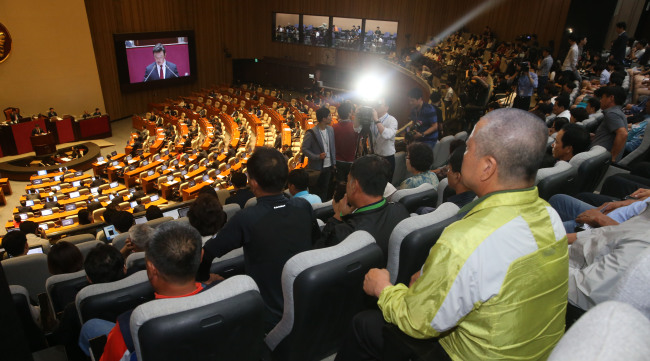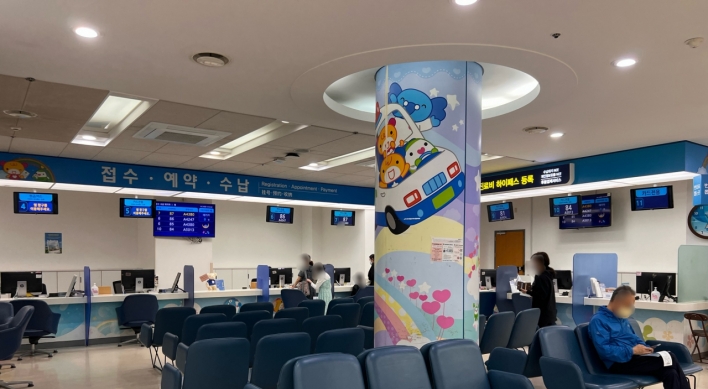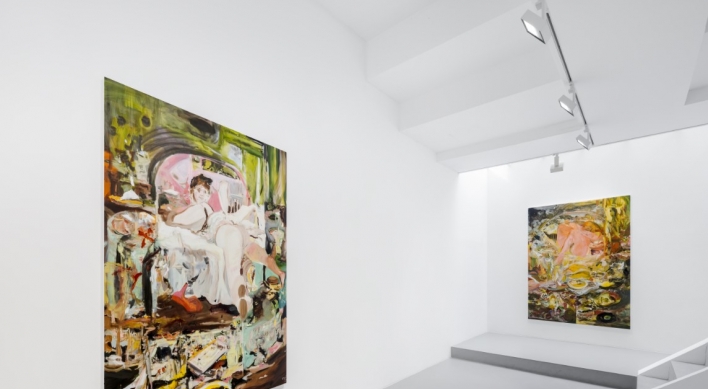An intense debate took place at the National Assembly on Tuesday over the Seoul government’s decision to have the U.S. station its missile defense system here, as the rival parties and the government relayed polarized views on the plan’s potential domestic, military and diplomatic impact.
Citing North Korea’s test-firing of three missiles earlier in the day, the administration and the ruling Saenuri Party stressed the need for the Terminal High Altitude Area Defense system to safeguard the South from evolving nuclear and missile threats from across the border.
North Korea test-fired three ballistic missiles from Hwangju, North Hwanghae Province, at around 5:45 a.m. in a move that was seen as a protest against the allies’ decision to deploy the missile system here by the end of this year.
The opposition parties, in contrast, focused on the government’s one-sided announcement of Seongju, North Gyeongsang Province, as the battery’s location without any consultations with residents there, while displaying concerns about possible diplomatic consequences.
Citing North Korea’s test-firing of three missiles earlier in the day, the administration and the ruling Saenuri Party stressed the need for the Terminal High Altitude Area Defense system to safeguard the South from evolving nuclear and missile threats from across the border.
North Korea test-fired three ballistic missiles from Hwangju, North Hwanghae Province, at around 5:45 a.m. in a move that was seen as a protest against the allies’ decision to deploy the missile system here by the end of this year.
The opposition parties, in contrast, focused on the government’s one-sided announcement of Seongju, North Gyeongsang Province, as the battery’s location without any consultations with residents there, while displaying concerns about possible diplomatic consequences.

Rep. Yi Wan-young of the ruling Saenuri Party, whose constituency includes the northeastern county, lashed out at Defense Minister Han Min-koo for making a “unilateral decision and announcement for the sake of military intelligence.”
“I had enquired many times on where the site would be, and did so just one day before the announcement, and you said it was still being reviewed. Why did you lie to me?” Yi prodded Han.
He also took issue with the government’s failure to notify the visit to Seongju by Prime Minister Hwang Kyo-ahn during which the residents staged an intense protest.
“I don’t oppose to the deployment if THAAD is really critical to national interests, but not this way,” Yi said.
Kim Jong-dae, a lawmaker of the minor opposition Justice Party and a prominent military expert, warned that the decision was the “outcome of North Korea-instigated fears” and may cause “pricey aftermath” in terms of diplomatic ties with China and Russia.
“A best policy would be to preclude provocations using the already available strategic assets, while engaging defusing cross-border tension through preventive diplomacy. Now is the time to pursue a strategic balance on the peninsula,” he said.
But Rep. Kim Jin-tae of the ruling Saenuri Party called for the anti-THAAD camp to change course, saying Pyongyang’s newest provocation represented the plan’s legitimacy. He also referred to Monday’s demonstration in Guam during which electromagnetic radiation from a radar there were shown to be far below feared levels.
Saenuri floor leader Rep. Chung Jin-suk also said it is time to unite to defend national interests and national security and end “chaos that keeps coming back after major national projects one after another.”
“A sustained south-south confrontation regarding the THAAD would only benefit the Kim Jong-un forces,” he at a general meeting of party members before the questioning.
To help alleviate the resistance in Seongju, the prime minister vowed to ramp up efforts to convince them by visiting the area if needed, and carry out environmental impact assessments and other necessary action.
He also said while presiding over a cabinet meeting earlier that he would explore measures to boost the region’s development “from an intergovernment level.”
By Shin Hyon-hee (heeshin@heraldcorp.com)
“I had enquired many times on where the site would be, and did so just one day before the announcement, and you said it was still being reviewed. Why did you lie to me?” Yi prodded Han.
He also took issue with the government’s failure to notify the visit to Seongju by Prime Minister Hwang Kyo-ahn during which the residents staged an intense protest.
“I don’t oppose to the deployment if THAAD is really critical to national interests, but not this way,” Yi said.
Kim Jong-dae, a lawmaker of the minor opposition Justice Party and a prominent military expert, warned that the decision was the “outcome of North Korea-instigated fears” and may cause “pricey aftermath” in terms of diplomatic ties with China and Russia.
“A best policy would be to preclude provocations using the already available strategic assets, while engaging defusing cross-border tension through preventive diplomacy. Now is the time to pursue a strategic balance on the peninsula,” he said.
But Rep. Kim Jin-tae of the ruling Saenuri Party called for the anti-THAAD camp to change course, saying Pyongyang’s newest provocation represented the plan’s legitimacy. He also referred to Monday’s demonstration in Guam during which electromagnetic radiation from a radar there were shown to be far below feared levels.
Saenuri floor leader Rep. Chung Jin-suk also said it is time to unite to defend national interests and national security and end “chaos that keeps coming back after major national projects one after another.”
“A sustained south-south confrontation regarding the THAAD would only benefit the Kim Jong-un forces,” he at a general meeting of party members before the questioning.
To help alleviate the resistance in Seongju, the prime minister vowed to ramp up efforts to convince them by visiting the area if needed, and carry out environmental impact assessments and other necessary action.
He also said while presiding over a cabinet meeting earlier that he would explore measures to boost the region’s development “from an intergovernment level.”
By Shin Hyon-hee (heeshin@heraldcorp.com)




![[Grace Kao] Hybe vs. Ador: Inspiration, imitation and plagiarism](http://res.heraldm.com/phpwas/restmb_idxmake.php?idx=644&simg=/content/image/2024/04/28/20240428050220_0.jpg&u=)

![[Herald Interview] Mom’s Touch seeks to replicate success in Japan](http://res.heraldm.com/phpwas/restmb_idxmake.php?idx=644&simg=/content/image/2024/04/29/20240429050568_0.jpg&u=)


![[News Focus] Lee tells Yoon that he has governed without political dialogue](http://res.heraldm.com/phpwas/restmb_idxmake.php?idx=644&simg=/content/image/2024/04/29/20240429050696_0.jpg&u=20240429210658)








![[Today’s K-pop] Seventeen sets sales record with best-of album](http://res.heraldm.com/phpwas/restmb_idxmake.php?idx=642&simg=/content/image/2024/04/30/20240430050818_0.jpg&u=)